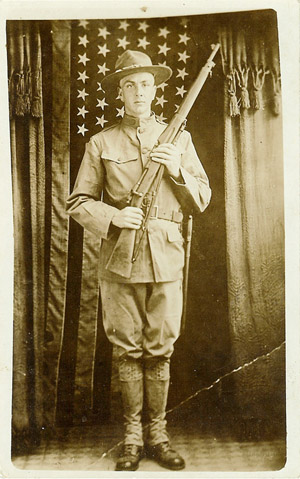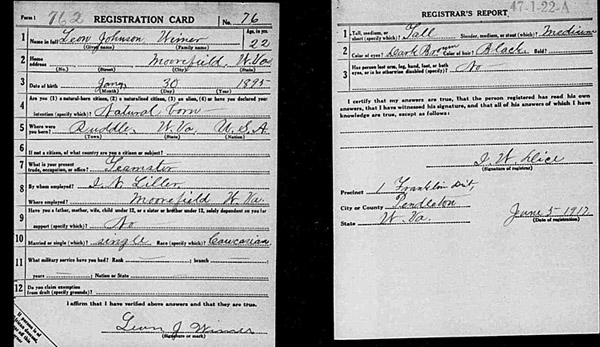
Courtesy Eric Hedrick

Remember...
Leon Johnson Wimer
1895-1918
"Soldiers are citizens of death's grey land, drawing no dividend from time's tomorrows."
Siegfried Sassoon
 Courtesy Eric Hedrick |
Remember...Leon Johnson Wimer
|
Leon Johnson Wimer's parents, William C. Wimer and Mary Jane Hedrick Wimer, were married on May 5, 1893, in Pendleton County, West Virginia. Leon was born on January 30, 1895, at Ruddle in Pendleton County. Leon had a younger sister, Bettie Catherine, who married William Edward Mullenax.
During the Civil War, Andrew Joseph Wimer, Leon's grandfather, had served as a private in Company C of the 14th Virginia Cavalry in the Confederate Army.
Following the sinking of American merchant ships by German submarines, the United States declared war against Germany on April 6, 1917. When the call for volunteers failed to produce the needed one million troops to support the war effort, the Selective Service instituted the draft with the first registration on June 5, 1917, for all men between the ages of 21 and 31.
On that day Leon registered for the draft at Franklin in Pendleton County. He was single and working as a teamster for I.N. Liller at Moorefield, West Virginia. His draft registration describes him as tall and of medium build, with dark brown eyes and black hair. No exemptions or disabilities were claimed.

World War I draft registration card for Leon Wimer. National Archives and Records Administration
The third registration for the draft started on September 12, 1918, for men ages 18 through 45. Leon's half-brother, Ira Clem Hedrick, who was 33 years of age, registered on that date at Petersburg in Grant County, West Virginia. World War I draft registration cards provide a great deal of demographic information, and Ira's states that he was married and working as a carpenter in Petersburg. He is described as tall and slender and having blue eyes and red hair.
During World War I, H.M. Calhoun of Pendleton County corresponded with many young soldiers from the county to inquire about their daily lives in the military. Leon Wimer's letter to Mr. Calhoun gives a first-hand account of the early days following his enlistment in the Army on August 6, 1917. While Mr. Calhoun apparently gave the recruits self-addressed postcards so they might inform him of their arrival at their training camps, Leon took the opportunity to write a detailed story of his unit's movements throughout the training process. His tone is light and familiar and somewhat scholarly, with a touch of humor.
From a Pendleton County boy
Ft. Sill, Okla, Oct. 26, 1917Mr. H.M. Calhoun
Franklin, WVMy dear Sir:
Am in receipt of your letter of the 11th inst, and in reply to your request for information about my personal history and movements since joining the army, I present the following data.
I enlisted in the Quartermaster Corps of the Army on Aug. 6, of this year, taking out my first papers at Cumberland, Md. From there I was sent to Baltimore, and then to Columbus Barracks, Columbus, Ohio. At this last place I underwent the strenuous physical examination required of all applicants, all of which I passed successfully, and came out a fullfledged recruit of Uncle Sam's big family of warriors.
My training began immediately after being sworn in. The army cot with one blanket was introduced to me and has proved a fast friend up to this date. "Mess" was the most popular call that was sounded, the response coming from every man. This incident occurs three [times] daily in army life - "beans and coffee, for breakfast, coffee and beans for dinner and for supper we have a change - beans and coffee," Of course this is somewhat exaggerated; the mess as a rule being somewhat homelike with good variety and excellent quality of both victuals and preparation.
During my month's stay at Columbus Barracks we were taken out every day by previously trained officers and given three hours drill and calisthentics. We soon learned to Right face!; to the rear march!; hands on hips, place! and about forty-eleven other peculiar exclamatory demands.
Of course we had to do a little other muscular exercise besides march around the parade ground but we never mind this because such duties are given very pleasant titles. We never say "work" in the army, but fatigue is the word. Kitchen Police doesn't sound much like peeling potatoes, scrubbing tables and floors in the mess hall [but] that is what it means.
Reveile sounds every morning at 545 and we have to pile out without much time to stretch or think about our nice dreams of the night, in order to get breakfast mess at 600. Retreat sounds at 6 P.M. We have to be on hand to answer roll call and listen to the strains of the Star Spangled Banner from the company band should we be fortunate enough to possess one. "Tatoo Call" at 915 or 930 at night blows all lights out. "Taps" means for every one to be in his bunk and preparing for tomorrow's duties.
On the 26th of August we were loaded aboard a south bound train - seven car loads of us anxious to see the country. We had a pleasant trip which landed us at San Antonio, Texas. We were taken to the Q.M. Detachment quarters at Ft. Sam Houston and for two or three days were given plenty of drill and fatigue to keep any ordinary person busy. There were hundreds of recruits coming in every day or two from the different recruiting districts all over the U.S., so we did not stay there long but were loaded into trucks and were hauled about twenty five miles north west of "Sanantone" into the jungles and cactus of Texas, to another army camp called Leon Springs. Besides our Q.M. Detachment there was a school of twenty two hundred officers-in-training, a camp of engineers, several batteries of artillery, troops of cavalry and one regiment of infantry, the 57th.
We spent exactly one month at this place, Leon Springs, before we were given orders to move on. Our trip to Ft. Sill, Okloma was a very pleasant one, a day of which being spent by taking in Ft. Worth, Texas. Upon landing at Ft. Sill we found the weather somewhat cooler, and talk about wind, it blows to beat the band all the time. At present I am located at the Auxiliary Remount Depot, it being a part of Camp Doniphan. Here we have charge of large number of recruit mules and horses.
An aviation camp is near us on the south and the purr of the big war-birds is so common now that we seldom notice the machines at all.
Taking all-in all I am quite satisfied with army life but will be glad when my services will no longer be needed and I can get back to civilian life and friends once more.
Thanking you for the interest you are taking in us fellows who are fighting for Uncle Sam and wishing you success in this undertaking as well as all others, I beg to remain
Respectfully yours,
Leon J. WimerAux. Rem't Depot
Camp Doniphan
Ft. Sill
OklaP.S. I would appreciate a publication of this thru the "Pendleton Times", just to let my friends know of the life we are leading in the army. L.J.W.
While stationed at Camp Doniphan, Leon contracted measles, which led to pneumonia and took his life on January 31, 1918. The U.S. Army Medical Department, Office of Medical History, explains the high incidence of measles during the war in the following manner:
During peace times when troops are in garrison, measles is a disease which gives relatively little concern to the medical department of an army; most troops, under such circumstances, having had some years of service, either have had the disease and thus developed an immunity to it, or, having been exposed, have escaped the disease by reason of the fact that they already possessed an immunity. Therefore, during peace times, measles usually has been limited, in so far as serious outbreaks in the Army are concerned, to recruit depots. On the other hand, when the Army has been greatly expanded, as in mobilization for war, the incidence of measles greatly increased. Thus measles has played a very important part during the various wars in which the United States Army has participated. (Source: Communicable Diseases, Chapter XII, "Measles: Statistical Considerations Prior to the World War," http://history.amedd.army.mil/booksdocs/wwi/communicablediseases/chapter12.html, accessed 7 Dec. 2015.)
Photo and other materials provided by Eric Hedrick, whose great-grandfather was a half-brother to Leon Wimer.
Article prepared by Leon Armentrout, with assistance from Patricia Richards McClure
December 2015

West Virginia Archives and History welcomes any additional information that can be provided about these veterans, including photographs, family names, letters and other relevant personal history.